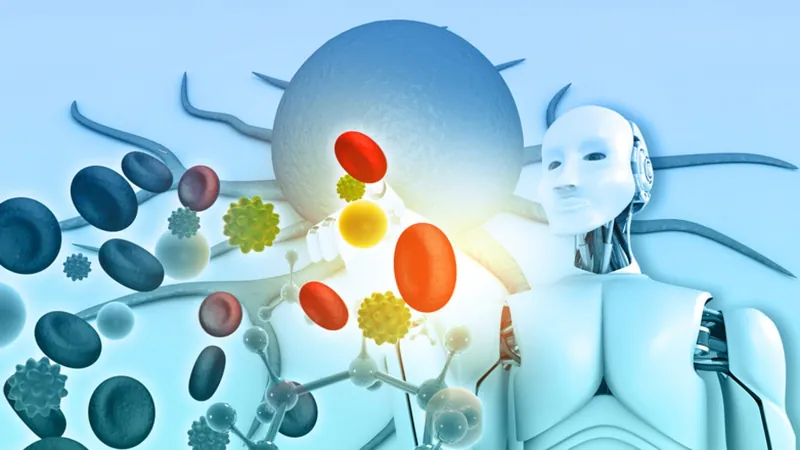
2025: The Year AI Revolutionizes Precision Oncology!
2025-06-16
Author: Wei Ling
A New Era in Cancer Treatment
Cancer treatment has seen a revolutionary shift with the rise of personalized medicine, a game-changing approach that tailors therapies to individual patients. With artificial intelligence making strides, many experts predict that 2025 will mark a pivotal moment for precision oncology.
The Foundations of Precision Medicine
Dating back to the 1990s, precision therapies emerged when researchers discovered that certain drugs worked best on cancers with specific genetic or biomarker profiles. Prior to this, cancer care was dominated by broad methods like chemotherapy and radiotherapy, often resulting in harsh side effects for patients.
Mohan Uttarwar, CEO of 1Cell.Ai, emphasizes that "cancer is a deeply individualized disease" and insists that every oncology treatment should be precision-driven.
AI: Transforming the Landscape of Oncology
Artificial intelligence has swiftly become a cornerstone of precision oncology, harnessing vast data sets to discover patterns and make predictions that were previously beyond our reach. As Ofer Sharon, CEO of OncoHost, explains, AI is transitioning drug development from intuition-based practices to data-informed strategies.
AstraZeneca’s Arun Krishna notes that AI has drastically altered the drug discovery landscape, enabling more profound insights into patient care and treatment effectiveness.
Enhancing Drug Discovery and Patient Selection
AI can dissect entire cancer genomes, uncovering mutations ideal for targeting in treatments. This capability significantly enhances the design of clinical trials and maximizes the chances of success.
Moreover, AI can help identify new biomarkers, refining patient selection to ensure the right individuals receive appropriate therapies. This optimization is crucial for improving clinical outcomes.
A Look Into the Future of Drug Development
The expansive potential of AI in drug discovery continues exhilaratingly. For instance, AstraZeneca has invested heavily—over $1 billion—into AI partnerships, aiming to speed up the identification of effective drug molecules. What used to take months or years can now be achieved in just 30 days!
Additionally, companies like Pfizer and Novartis are rapidly advancing their AI capabilities, seeking to reshape the future of drug development with innovative technologies.
Generative AI: A Leap Forward
Another exciting frontier is generative AI, which does not just analyze but creates novel solutions based on existing data. This innovation was recently highlighted when Insilico Medicine advanced a drug, fully designed by AI, into Phase II clinical trials.
Experts predict that as generative AI develops, it will unlock unprecedented therapeutic possibilities by suggesting entirely new compounds and accelerating the pace of innovation.
Multifaceted Approaches to Precision Oncology
The future of precision oncology lies in integrating multi-omics data—encompassing genomics, proteomics, and metabolomics. This holistic view promises a more nuanced understanding of cancer, moving beyond isolated mutations to the complex interplay of biological systems.
Sharon remarks that AI's ability to process and reveal unseen patterns in these complex datasets is crucial for credible insights that can drive effective treatments.
Challenges Ahead: The Data Dilemma
Despite its promise, the application of AI in oncology is fraught with challenges. The reliability of AI models hinges on the quality of the input data. Inconsistent or biased datasets can undermine the applicability of AI insights.
To realize AI's full potential, the medical and scientific communities must unify their data management strategies. A transparent and standardized approach is imperative to ensure actionable and trustworthy outcomes.
The Turning Point: Looking Ahead to 2025
As the integration of AI in oncology matures, experts believe that 2025 will see the emergence of the first AI-discovered or AI-designed oncology treatments entering clinical trials, marking a significant shift in therapeutic development.
With AI-driven capabilities evolving rapidly, the future looks bright for cancer care. Buckle up—2025 is set to be a groundbreaking year for precision oncology!


 Brasil (PT)
Brasil (PT)
 Canada (EN)
Canada (EN)
 Chile (ES)
Chile (ES)
 Česko (CS)
Česko (CS)
 대한민국 (KO)
대한민국 (KO)
 España (ES)
España (ES)
 France (FR)
France (FR)
 Hong Kong (EN)
Hong Kong (EN)
 Italia (IT)
Italia (IT)
 日本 (JA)
日本 (JA)
 Magyarország (HU)
Magyarország (HU)
 Norge (NO)
Norge (NO)
 Polska (PL)
Polska (PL)
 Schweiz (DE)
Schweiz (DE)
 Singapore (EN)
Singapore (EN)
 Sverige (SV)
Sverige (SV)
 Suomi (FI)
Suomi (FI)
 Türkiye (TR)
Türkiye (TR)
 الإمارات العربية المتحدة (AR)
الإمارات العربية المتحدة (AR)